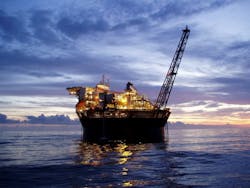OGUK provides update on COVID-19 testing, safety measures for offshore crews
Offshore staff
ABERDEEN, UK – Oil & Gas UK (OGUK) continues to develop testing protocols for the coronavirus for personnel travelling to and from UK offshore oil and gas installations.
During a briefing late last week, Health and Safety director Trevor Stapleton said the association had started working with the UK government on the best way forward for offshore staff, which it believes should be regarded as ‘critical workers.’
OGUK continues to monitor progress on the two main tests for antigens (swab-based) and antibodies (finger-prick tests), although the latter has yet to be validated.
In the meantime, OGUK and its member companies have developed a procedure whereby staff presently living at their homes could go to a local testing center a few days before their scheduled journey offshore, then wait a few more days for the result of the test to come through as negative before proceeding to their destination.
Some offshore operators do have access to swab testing for confirmed coronavirus cases, Stapleton said, using a test center in Aberdeen, although this may not necessarily be government-approved.
For offshore workers in more vulnerable categories, the association has developed a ‘mix and match’ protocol, he added, based on government and World Health Organization guidelines. “It’s employers’ duty to assess their workforce, but offshore duty holders or operators can still impose their own restrictions, as it’s their installations.”
OGUK continues to work with Step Change in Safety on Q&A services and other sources of information for the offshore workforce, such as webinars.
Helicopter providers have made available two types of adapted aircraft: Category C to handle suspected cases displaying mild symptoms, and Category D search and rescue helicopters for managing life-threatening conditions.
Onboard, some form of isolation has been provided for doctors, Stapleton said, and social distancing also applies for passengers.
Temperature checks are applied to all people coming to heliports, he added, but it is also up to individuals to provide truthful and accurate responses to questions, he stressed. “If you or your family have developed a cough, you should declare that.
“There is a lot of literature on the subject which anyone can read: to an extent, the workforce has to take on this accountability.”
OGUK has been assessing the merits of masks for passengers during flights, but there are also concerns that if the helicopter has to ditch in the sea, and breathing equipment has to be deployed, the masks could get in the way. However, OGUK is working on a potential solution which it aims to have tested soon at a survival training center, to ensure this would work in an emergency.
OGUK’s Pandemic Steering Group continues to work with various sub-groups on ensuring safe passage for offshore crews trying to commute between their homes and UK heliports; safeguarding supplies of oilfield equipment; and identifying safe haven hotels for crews close to airports on the UK’s northwest and eastern coasts, and on Shetland.
Stapleton confirmed that there had been a confirmed case of COVID-19 on the FPSO Hummingbird Spirt serving the Chestnut oilfield in the central North Sea. Production has been temporarily shut in as operator Spirit Energy and partner Dana Petroleum were reportedly not comfortable with continuing operations on minimal manning.
04/13/2020
